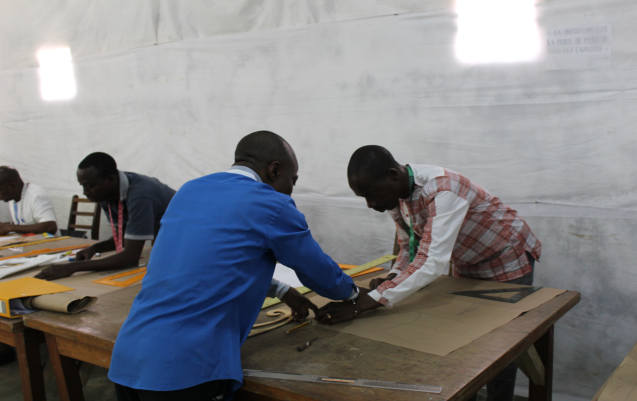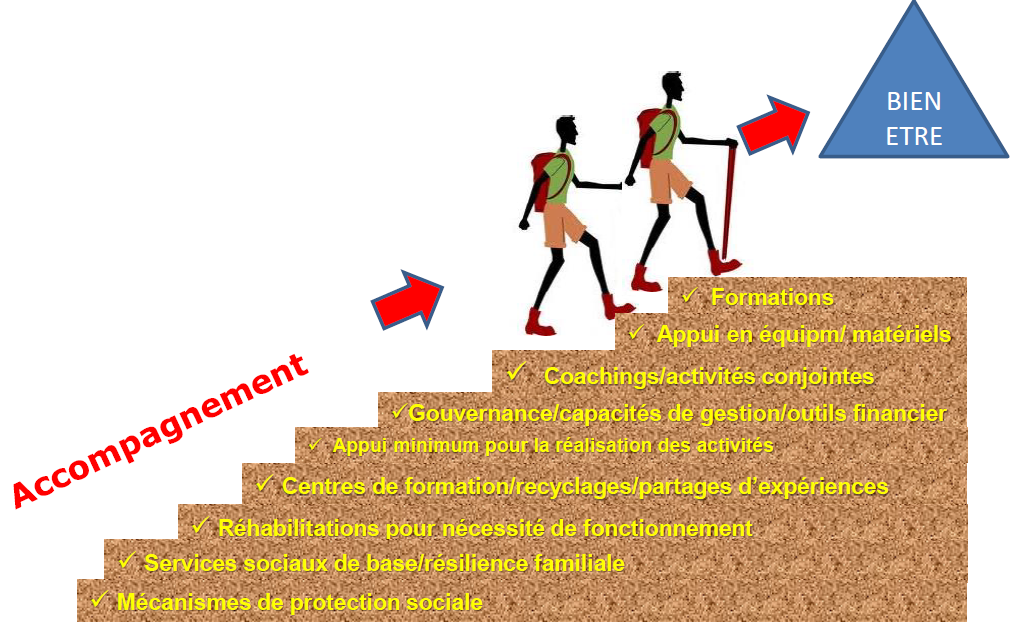AVSI Integrated approach toward informal economy in Côte d’Ivoire.
Discussion details

RNSF implementing partner AVSI organized last December the closing ceremony of its project “Empowerment for better livelihoods, including skills development and vocational education and training, for marginalised and vulnerable persons and people dependent on the informal economy” implemented in Côte d’Ivoire since 2015.
It was organized at Abidjan with around 400 participants, including the European Union, the National Chamber of Trades of Côte d’Ivoire, the Regional Chambers of Crafts, the National and International NGOs, the Social Centres, the Professional Organizations of Craftsmen and some of the craftsmen beneficiaries of the project as well as RNSF research expert Jacques Charmes. During the event AVSI presented the results and the lessons learned from this experience and animated a discussion about the future steps to be carried out in Côte d’Ivoire.
The overall objective of the project was to contribute to the improvement of living and working conditions of craftsmen in the informal sector with special attention for those infected / affected by HIV / AIDS, specifically through the improvement of the institutional framework, skills and social integration of artisans in Abidjan, Yamoussoukro and Bouaké (Côte d’Ivoire).
To that end, it promoted an integrated approach toward informal economy combining:
- Institutional capacity building
- Skill development and Strengthening of workers’ capacities and organisation
- Livelihood and social inclusion, in particular through microcredit and health coverage
Various activities were implemented such as:
- Trainings of craftsmen
- Workshop renovation
- Establishment of saving groups and pilot health insurance schemes
- Dissemination of information, awareness-raising and advocacy

AVSI theory of change
During the ceremony, the results of the ROM monitoring (February 2017) and of the final evaluation as well as two studies conducted during the project on the pilot health insurance scheme and the formalisation of the informal sector were presented.
In particular, the final evaluation highlighted the various achievements of the project and the ROM monitoring indicated that it paved the way to the improvement of the craftsmen’ living and working conditions and to the definition of a development strategy for the craft sector in Còte d’Ivoire.
(11)
Log in with your EU Login account to post or comment on the platform.
Great thanks to the RNSF staff for their support along the project lifetime. We expect to have moments to share our findings and best practises, which come out from our Project. Special thanks to the UE commission.
Dr Bamba, AVSI project Manager
Nous félicitons AVSI pour la présentation des résultats et des leçons apprises de son projet qui a contribué certainement à l’amélioration des conditions de vie des personnes et groupes vulnérables qui dépendent de l’économie informelle dans quelques grandes villes de la Côte -d’Ivoire.
Nous félicitons également l’équipe de RNSF pour son accompagnement technique avec l’appui financier de l’Union Européenne. Nous apprécions les stratégies mises en place pour la réussite de ce projet à savoir le développement des compétences, le développement des activités génératrices des revenus et la formation professionnelle.
Notre souhait le plus ardent est que ces genres d’initiatives puissent s’étendre dans d’autres pays de l’Afrique Subsaharienne à l’occurrence la République Démocratique du Congo dont les populations vivent de l’économie informelle pour essayer d’améliorer tant soit peu leur bien-être.
Raphael Ngeleza,
Consultant Professionnel Indépendant en planification, management, suivi et évaluation des projets.
République Démocratque du Congo.
Thanks for your feedback! Merci !
If you want to know more about this project of AVSI, watch the following 12-minute video presented during the closing ceremony:
Pour plus d'informations sur ce projet d'AVSI, voici le film (12 minutes) présenté durant la cérémonie de cloture:
I have had the opportunity to participate to the closing ceremony of AVSI project for empowering the handicrafts of Côte d’Ivoire, and earlier I had the chance to visit the partners of the project and their beneficiaries: potters of Darakodougou (Katiola) and seamstresses, wood carvers of Bouaké, weavers of Bonnizambo (Yamoussoukro), carpenters and furniture makers of Yopougon (Abidjan)…
What stroke me the most is the way AVSI successfully built trust among the professional communities, encouraging savings through the GESCO (the groups of savings and community solidarity) and the allocation of part of these savings to contribute to mutual funds for health coverage. The risks covered are flexible and so are the contributions and the beneficiaries have begun to measure the advantages of being covered: the probability for the project to continue after the closure of the project is high, even if consolidation would be necessary especially in strengthening the capacities of the Chambers of crafts that constitutes the armature of the support system.
Another good practice relates to training and especially training in design that has open new opportunities for potters and tailors for instance who are now able to offer new kinds of potteries or shirts more likely to attract new customers.
These are two examples of good practices, among many others, that the AVSI project on empowerment of handicrafts in Côte d’Ivoire gives us to see and on which it is possible to capitalise.
"the probability for the project to continue after the closure of the project is high" Said Jacques CHARMES.
I would add this: Since I had the opportunity to manage this Project during 3 years and I am confident that our best practices will serve government and other stakholders commited to improving life of informal workers. And the key question i still asking is.."how worth is to increasing the income of craftmen, without any attention to their social inculsion". Out of our Projet I can affirm "Social inclusion highly helps building better resilience for informal workers".
Yesterady I received a call from the Ministry of employment and social protection inviting AVSI to participate and share its experience during an upcoming workshop next days on the topic"Strategies to extend health insurance coverage to informal workers" in Côte d'Ivoire.
Thanks Jacques for your mentoring
Dear Pierre,
My congratulations regarding successful implementation of the Project.
Despite the fact that the Video is only in French (unfortunately, I don't master it), I got an impression that the Preoject was really successful, because supported people to have a job and gave them an opportunity to make a living.
If you allow me I would like to ask you question about Labor legislation, especially Labor Code and labor safety rules, are they in place or not? And also, what about the special rules regulating the women labor and child protection.
Thank you very much
Dear Arsen, thanks for your feedback!
Regarding the labor law in Cote d'Ivoire, I suggest you refer to the ILO's website for a first overview, in particular the 2 following links:
http://www.ilo.org/ipec/Regionsandcountries/Africa/C%C3%B4tedIvoire/lan…;
http://www.ilo.org/dyn/eplex/termmain.showCountry?p_lang=en&p_count…;
Best, Pierre
Dear Jindra,
Certainly the success of the project in term of perenisation still needs to be prooved. At this stage, there was a baseline conducted at the start of the project and a survey is on-going for assessing the situation at the end of the project. The current statistics about the project are numbers of beneficiaries.
I agree that the conduct of a survey one year after the closure of the project would be necessary to confirm its success. Of course this kind of post-project survey was not included in the terms of reference. But it would be useful and we should find a way to implement such a survey in one year from now.
For the final assessments AVSI has mobilised academic labs from the University (Félix Houphouet-Boigny) and National Research Centre (CIRES) and I am confident that these partners could be interested in such a post-project survey, all the more so as an academic publication could be an outcome for all these studies.
Dear Arsen,
In complement to Pierre's reply, I think that your question deserves more thorough reflexion.
Access to social protection through regular saving and contribution to community groups and a mutual fund is certainly a step toward transitioning from the informal to formal economy. But it remains an individual approach. The micro-entrepreneurs of the informal sector are mainly own-account workers, but some of them may employ apprentices or even some paid employees. ANd it is not sure that they are concerned about the social protection or the health coverage of their own employees. These employees must be convinced and encouraged to join the community groups as well in view of saving and contributing for themselves.
In other words, the existence of a national legislation on labour, as good as it may be, does not mean that the state is able to enforce it and that the entrepreneurs are able to apply it.
For a project or an NGO in charge of a project, it can be an objective to convince its beneficiaries to operate in conformity with the laws, but it cannot be always a condition of the action, even if it is possible to give preference to the micro-entrepreneurs who do not employ children, or who accept to send their apprentices to vocational training centres for example. In this sense many projects are multidimensional, attacking informality on many fronts at the same time, but this multidimensional character must not dilute the main objectives of the action.
It is through training sessions that the beneficiaries can be sensitised to such issues as labour safety or child labour or other aspects of labour and social security laws.
Jacques
Dear Jacques,
Thank you very much for so detail and thorough answer to my question. Now I get clear understanding about actual situation.
Best regards, Arsen